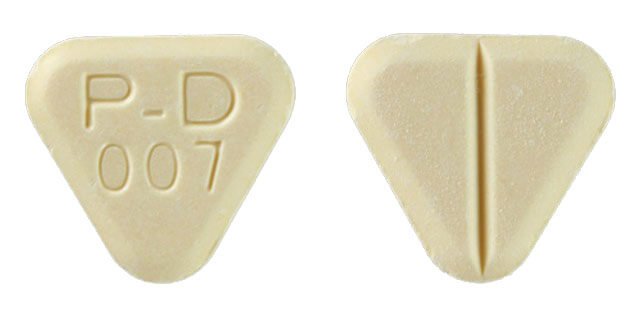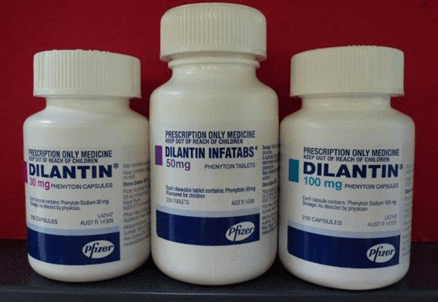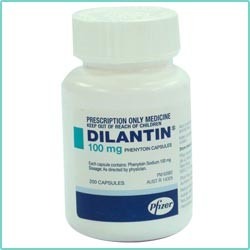Product liability lawyers are actively investigating the potential Dilantin lawsuit and studying class action proceedings against Pfizer, the drugmaker that produces the controversial medicine.
Dilantin (also known as Phenytoin) is an anticonvulsant medicine applied to treat patients suffering from epilepsy or seizures.
Yet, scientists and class action attorneys have informed the public that long-term Phenytoin use may lead to birth defects and may cause serious medical complications that can permanently alter a person’s movement, speech, and coordination.
Excessive Dilantin treatments can further produce debilitating pain, scarring, blindness, organ failure and sometimes death.
Class Action Attorneys Scrutinize Dilantin Applications
For over seventy years, Pfizer has sold Dilantin as a prescription drug for grand mal seizure treatment and as an off-label medication for patients suffering from headaches, depression, panic attacks and anxiety.
Phenytoin’s endurance in the marketplace has allowed products liability attorneys and their scientific research teams to examine the drug’s effect on patients, and most lawyers agree the scientific evidence that followed is of significant public interest:
Both technical and contingent evidence cited in medical journals and established in the Dilantin lawsuit suggest when Phenytoin’s active ingredient decreases abnormal electrical activity in the brain, one’s body becomes more prone to acquire Stevens-Johnson Syndrome (SJS) and toxic epidermal necrolysis (TEN).
Phenytoin or Dilantin Side Effects Produce SJS and TEN
SJS is a disorder that alters skin tissue and mucous membranes and often produces painful blistering rashes and skin burns. The condition escalates to TEN when rashes reach over thirty percent of the body.
Physicians warn that Dilantin SJS and TEN reactions are serious medical conditions that call for emergency care and hospitalization with treatment in an Intensive Care Unit or Burn Center.
Dilantin SJS responses start with a fever, sore throat and jade; ulcers and skin lesions around the mouth or genital regions soon follow with painful rashes or debilitating blisters typically developing throughout the body as the condition gets worse.
Other SYS and TEN symptoms from Phenytoin reactivity may include:
- Hives, boils or red spots around the mouth
- Blisters inside the nose
- Swelling of the eyelids
- Flu-related symptoms
- Widespread skin pain
- Facial or tongue swelling
Dilantin SJS may further cause blindness if scar tissue forms behind the eyelids and pulls on the victim’s cornea.

Phenytoin Toxicity in the News
Products liability authorities have also studied Dilantin toxicity attachments to a more severe medical condition called cerebellar atrophy.
In 2008, The Journal of Clinical Pharmacy and Therapeutics published research that documented cases linking Dilantin to rear brain dysfunctions and cerebellar lesions.
The scientists in this study initially believed Phenytoin toxicity only offered temporary cerebellum consequences, analogous to alcohol intoxication where subjects experience slurred speech, mental distraction, slowed movement, nausea and vomiting.
However, the doctors’ confirmed that Dilantin toxicity actually produces long term staying effects after examining the control groups’ brains and finding they possessed permanently deteriorated cerebellums.
Dilantin Induced Cerebellar Atrophy
Cerebellar atrophy is tissue degeneration in the rear of the brain that produces a loss of balance while walking and slow body movements.
Dilantin causes harmful cerebellar degeneration only when the drug accumulates within the body to Phenytoin toxicity levels.
Dilantin lawsuits assert both Pfizer and physicians have long recognized that taking Phenytoin to manage seizure disorders, psychiatric ailments, and some degenerative diseases such as multiple sclerosis can cause cerebellar shrinkage.
Let’s examine a few scientific studies that reveal how long term Dilantin use for pacifying neurons in the cerebellum area can degenerate cells enough to bring about atrophy complications:
- The MIH documented in 1990 that Phenytoin may cause loss of neurons; test subjects in this trial study used Dilantin for more than five years and experienced unsteady gait, speech problems and impaired muscle control due to cerebella nerve cell deficiencies in the brain. (Source)
- Another 1994 study indicated that seizure disorder patients receiving Dilantin developed smaller cerebellums overall compared to the placebo group who demonstrated larger lobes in the same area. (Source)
- In 2003, scientists observed a distinct relationship between cerebellar atrophy and long-term Dilantin use after patients with blood level Phenytoin toxicity suffered irreversible deterioration in their cerebellums.
Symptoms of Cerebellar Atrophy
You may experience the following cerebellar atrophy symptoms, according to Clevland Clinic:
- Balance problems, vertigo or dizziness.
- Decreased muscle tone (hypotonia)
- Eye problems, including double vision and involuntary eye movements (nystagmus).
- Poor muscle coordination in your arms or legs (ataxia).
- Problems with motor skills, such as holding your head up or using your limbs.
- Tremors or sharking when performing muscle movements.
- Unsteady or uncoordinated walk with a wide gait.
Additional symptoms that are more common in people with paraneoplastic cerebellar degeneration include:
- Dementia (problems with memory, reasoning, and thinking).
- Slow and slurred speech (dysarthria).
Phenytoin and Trigeminal Neuralgia
Doctors prescribe Dilantin to treat trigeminal neuralgia, a medical condition that produces intense facial pain at rest or when performing particular movements; the discomfort is often spasmodic and can last for several hours.
Pfizer claims Phenytoin controls trigeminal neuralgia convulsions and discomfort by desensitizing one’s trigeminal nerve, the fiber responsible for sending sensations from the face to the brain.
However, Dilantin’s pain blocking effect only functions in elevated applications; this means the excessive quantities of Phenytoin that patients ingest for treating trigeminal neuralgia may provoke a heightened risk of toxicity, which can lead to cerebellar degenerative conditions and cerebellar degeneration.
Dilantin Toxicity Tied To Birth Defects
Scientists further classify Phenytoin as a teratogen, a medicinal after effect that carries the inherent capacity to interrupt fetal development and cause prenatal malformations. (Source)
Dilantin therefore may further stimulate an increase risk of serious birth defects among unborn infants.
Researchers believe Phenytoin’s teratogenicity stops folic acid intake; such an adverse effect often interferes with blood vessel construction in unborn children leading to complicated prenatal developments such as neural tube birth abnormalities.
Other possible Dilantin induced birth defects include:
- Dilantin Cleft Palate and Cleft Lip
- Mental Growth Deficiencies
- Phenytoin Heart Defects
- Dilantin Fetal Hydatoin Disease
- Microcephaly (skull malformations)
- Hypospadias (genital abnormalities)
- Limb Defects
- Sinal Disorders
Phenytoin Birth Defect Studies
The New England Journal of Medicine published a review in 2001 that revealed newborns exposed to Dilantin type drugs during prenatal care developed a doubled risk of obtaining congenital deformities or other birth defects, compared to infants who were not exposed to the drug in utero. (Source)
Researchers screened over 100,000 pregnant women between 1986 and 1993 and identified the following results between the two control groups:
- 20.6% of infants exposed to anticonvulsant drugs in the womb were born with serious birth defects.
- 28% of newborns who faced two or more anticonvulsants during pregnancy developed congenital deformities.
- Only 5.8% of infants not exposed to anticonvulsants developed birth defects.

Pregnant Women File Dilantin Lawsuits
The FDA classifies Dilantin as a D medication during pregnancy, indicating the drug carries the potential to cause significant fetal damage when taken during prenatal care, based on practical human evidence. (Source: Download PDF)
Despite these warnings, Phenytoin lawsuits allege Pfizer continues to market Dilantin affirmatively for treating pregnant mothers with epilepsy, ignoring the potential risks to unborn fetuses.
Pfizer Phenytoin / Dilantin Lawsuit
The FDA approved Phenytoin in 1953 for seizure treatment; but it was only when healthcare professionals made their 2008 SYS-Dilantin toxicity study public that the Agency compelled Pfizer to publish new warnings about the drug’s potential adverse toxicity links to SYS and TEN.
The drugmaker compiled by only adding “data suggests that individuals of Asian ancestry who carry the gene allele HLA-B*1602 may face a substantially increased risk of the Dilantin skin problems” to its warning labels. (Source: Download PDF)
SJS and TEN victims have since filled Dilantin lawsuit against Pfizer, holding the drugmaker continued to market Phenytoin while ignoring longstanding information that links Dilantin toxicity to increases risk of obtaining brain illnesses.
Other class actions contend the pharmaceutical company put its greed for profits before consumer safety by failing to include adequate warning labels that revealed the drug’s dangerous side effects to physicians and patients.
Some notable Dilantin lawsuits and settlements include:
- April 1998–A Massachusetts citizen sued Pfizer after Phenytoin toxicity caused TEN to form in over ninety percent of her body and induced blindness; the courts awarded this plaintiff $140 million in damages.
- November 2010–Pfizer settles a $4 million lawsuit with the estate of an SJS victim who died less than one month after taking Phenytoin.
- January 2010, an SJS patient in Ohio won a comparable $10 million jury award for cerebellar shrinkage complications.
- There are over 120 Dilantin SJS individual and class action lawsuits filed and pending.
Dilantin experts note Phenytoin toxicity claims throughout the United States and report on SJS and TEN class action lawsuits to notify those who may seek redress because of Pfizer’s inadequate warnings and recklessness business practices in the marketplace.
Adverse Effects of Dilantin
Dilantin side effects include headache, nausea, vomiting, constipation, dizziness, feeling of spinning, drowsiness, trouble sleeping, or nervousness.
According to WebMD, “Phenytoin may cause swelling and bleeding of the gums.”
You may report side effects to Federal Drug Administration at 1-800-FDA-1088 or at www.fda.gov/medwatch.
Frequently Asked Questions
-
Is there a class action lawsuit against Dilantin?
Pfizer, the maker of Dilantin was hit with a multi-plaintiff suit or mass tort case. It is not the same thing as a class-action lawsuit, as each case will be heard separately.
-
Does Dilantin cause brain damage?
Dilantin has been associated with cerebellar atrophy or degeneration, a type of brain damage caused by the deterioration of nerve cells in the cerebellum.
-
What are the side effects of long-term Dilantin use?
Long-term side effects of Dilantin MAY include cerebellar atrophy or degeneration which is a type of brain damage.
-
What are the symptoms of Dilantin Toxicity?
Please see Dilantin overdose information.
File A Dilantin Lawsuit
If you or a loved one took Dilantin, please contact us by filling out the form on this page.







